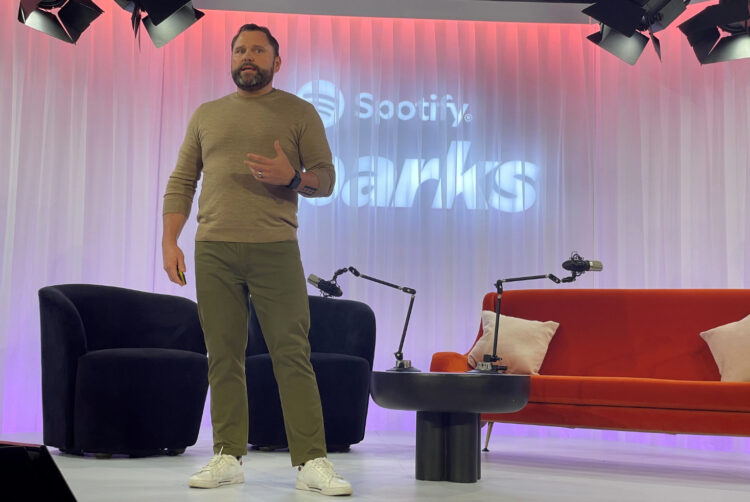Podcast inventory will be added to Spotify’s recently launched Ad Exchange (Sax) this quarter, associate director of product marketing Savanna Ramsey revealed at Spotify’s Sparks event in London on Thursday.
Generative-AI ads, which allow advertisers to create scripts and voiceovers within Spotify’s Ads Manager, will also roll out in the UK in Q2.
The streaming giant is “actively incorporating” UK accents into the tool.
Sax launched last month with only music inventory. In an interview with The Media Leader, UK and Northern Europe head of sales Ed Couchman said podcast inventory would be added to the platform “imminently” but declined to reveal a time frame.
Generative-AI ads have already been available to the US and Canadian markets, but not elsewhere.
“We know it wasn’t always easy to buy across Spotify,” said Ramsey. “That’s why we’ve been hard at work modernising and streamlining our adtech to make it easier for you to buy.”
She suggested that the platform is “evolving” to “think auction-based first and foremost” as it leans in to programmatic and seeks to deliver “outcome-based audio at your fingertips”.
Couchman earlier described efforts to launch Sax and generative-AI ads as an attempt to “move down the funnel into performance” and appeal to more small and medium-sized businesses, particularly digital-native direct-to-consumer brands.
“At the moment we’re working with, what, 10,000 advertisers?” Couchman said. “What this does is enable us to open up to many, many multiples of those advertisers — importantly, both large and small.”
Sax solo: Spotify launches own ad exchange
Spotify’s ‘pivot to video’?
In its Q1 earnings released this week, Spotify said it added 5m premium subscribers year on year to reach 268m. Monthly active users grew 10% to 678m.
The company also reported a record-high quarterly operating income of €509m, with overall revenue rising 15% to €4.2bn. It was Spotify’s fifth consecutive quarter of profitability.
Brian Berner, Spotify’s global head of sales, said Spotify has reinvested its profits primarily back into its free tier “with our ad stack, our ad technology, formats and continued innovation”.
He noted that Spotify “is becoming more visual”, with a greater emphasis on streaming music videos and video podcasts, opening up new opportunities for advertisers through new visual formats.
This has led to greater attentive use of the app, with Berner adding that there has been a 36% increase in “time spent in-focus, in view” on Spotify.
“We are creating more opportunities and more moments to reach an engaged audience that’s paying attention,” he continued. “Hence, we’re becoming more essential for brands.”
According to Berner, the same is true for users, 90% of whom Spotify claims have indicated the app is “essential to their daily life”.
“The feedback that we’ve gotten from our consumers is that the content on Spotify is nutrition, it’s fulfilling. Basically what they’re telling us is: you come to Spotify to feel good,” he continued.
“It’s not that you’re in an environment where you’re doomscrolling or in polarising discourse content. Nobody’s ever needed to take a break from Spotify.”
The attempted positioning of Spotify as a more positive platform comes years after it received backlash from musical artists for its support of controversial podcaster Joe Rogan, whose Covid-19 conspiracy theories, vaccine scepticism and more recent promotion of US President Donald Trump have contributed to political and cultural polarisation.
Apart from Rogan, Spotify’s top podcasters last year included Alex Cooper (Call Her Daddy) and Theo Von (This Past Weekend w/ Theo Von), the latter of whom has been described by The New York Times as “one of the defining conversationalists of media’s new MAGA-friendly mainstream”.
Spotify paid out more than $100m to podcasters in Q1 as part of its efforts to attract creator talent.
How Spotify is ‘removing friction’ to pursue the long tail
Adwanted UK are the audio experts at the centre of audio trading, distribution, and analytics. We operate J‑ET - the UK’s trading and accountability system for both linear and digital radio. We also created Audiotrack, the country’s premier commercial audio distribution platform, and AudioLab, the single-point, multi‑platform digital audio reporting solution delivering real‑time insight.
To scale up your audio strategy,
contact us today.





